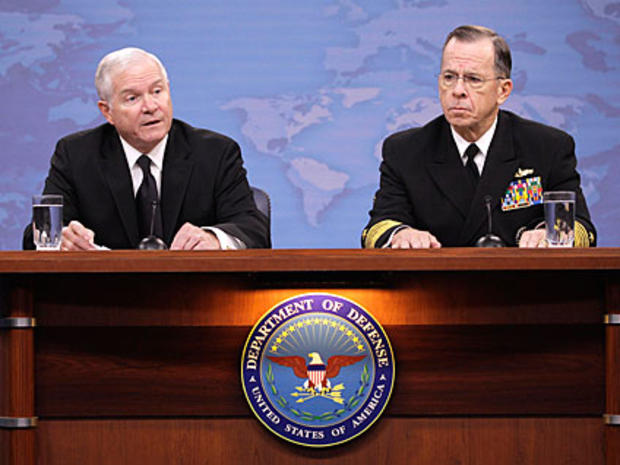"Don't Ask, Don't Tell" Repeal Blocked in Senate
Updated 5:46 p.m. Eastern Time
Senate Republicans have blocked a bill that would allow for repeal of the "Don't Ask, Don't Tell" policy banning gays from serving openly in the military.
Fifty-seven senators voted to move to debate on the bill, while 40 opposed it. Because of the filibuster role, 60 votes were needed to move forward.
The repeal provision was included in a defense bill lawmakers have been arguing over for months. The House already cleared the path for repeal, and there are 60 senators in the Senate who say they support repealing the 1993 policy.
But some Republicans who say they support repeal, including Massachusetts Sen. Scott Brown, voted against moving forward based on procedural objections.
Immediately after the vote, Independent Connecticut Sen. Joe Lieberman and Republican Maine Sen. Susan Collins said they planned to introduce a freestanding bill to repeal the policy, providing a glimmer of hope to advocates of legislative repeal this year. They could introduce the bill as early as today.
Lieberman said that while Thursday's vote was a setback, "it ain't over till it's over." He promised to "keep fighting until the last moment of this session."
If the standalone bill gets through the Senate, it will still have to go to the House before moving to the president's desk for signature.
Immediately following the vote, Lieberman and Collins, joined by Democratic Sen. Mark Udall of Colorado, questioned why Senate Majority Leader Harry Reid held the vote when he did not have 60 votes to move forward.
Collins was the only Republican to vote for the motion, while Democratic Sen. Joe Manchin opposed it. Republican Sens. Sam Brownback and John Cornyn and Democratic Sen. Blanche Lincoln did not vote.
Collins had opposed moving forward on procedural grounds but changed her mind after negotiating with Reid on amendments to the bill and time for debate. But other Republicans who have signaled openness to repeal -- among them Brown, Sen. Lisa Murkowski of Alaska, Sen. John Ensign of Nevada and Sen. George Voinovich of Ohio -- declined to follow suit.
Lieberman said Reid has promised to bring up his stand-alone bill for a vote before the lame duck session ends.
President Obama released a statement saying he was "extremely disappointed" in the vote and encouraging the lawmakers to revisit the issue before the end of the year.
"This law weakens our national security, diminishes our military readiness, and violates fundamental American principles of fairness, integrity and equality," he said.
With Republicans taking over the House and gaining votes in the Senate in the new Congress, legislative repeal appears unlikely in the new session. The issue continues to be litigated in the courts, and it was briefly overturned earlier this year.
A Pentagon survey this year found that while there are short-term challenges to repealing the policy, there would be minimal overall risk to military effectiveness if it were to be repealed.
The National Gay and Lesbian Task Force called the vote "a huge disgrace and disservice to our country."
"People from every background, every faith, every community across the country know that qualified, patriotic Americans willing to risk their lives by serving in the military should be able to do so, free of discrimination," Executive Director Rea Carey said in a statement.
Senate Republicans have objected to considering any measures in the lame-duck session before the Bush-era tax cuts are extended and the government is funded.
Defense Secretary Robert Gates and Adm. Mike Mullen, the military's top uniformed officer who chairs the Joint Chiefs of Staff, have called for Congress to repeal the ban, as has President Obama. Gates has warned that not doing so amounts to rolling the dice on a court-mandated repeal that would not give military leaders the time they need to effectively implement new policy.
A CBS News pollearlier this month found that 69 percent of Americans believe gay men and women should be allowed to serve openly in the military.
The defense bill also included a military pay raise, expanded health care benefits for service-members and funding for weapons programs and missions in Afghanistan. Reid released a statement shortly before the vote calling on Republicans to "stop hiding behind process and support our troops."
"The other side may feel passionately that our military should sanction discrimination based on sexual orientation, but they are clearly in the minority. And they have run out of excuses," he said, pointing to support for repealing the policy among top military commanders, members of the military and the public.
"And there is simply no evidence and no justification - legal, military or otherwise - for keeping this policy in place," he added. "There is no reason to keep American citizens from fighting for the country they love because of whom they love."
The provision in the defense bill would have allowed for repeal once military leaders, including President Obama, certify that it would not be disruptive. Gates has suggested that even if Congress repeals the policy it could be years before repeal goes into effect, since the military would engage in training and deal with the issues brought on by repeal before instituting the policy change.

